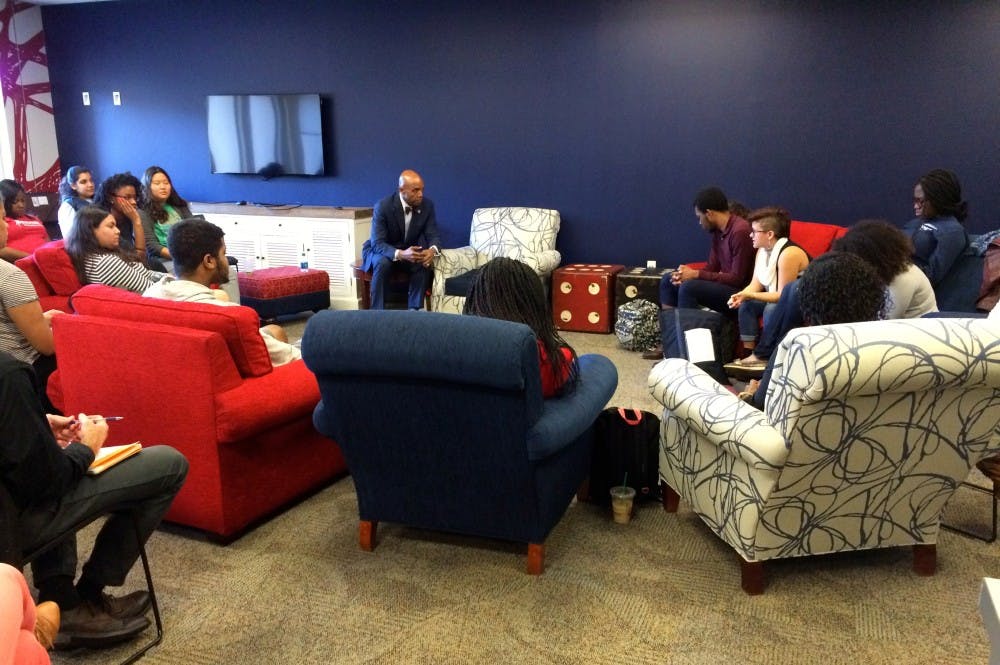At age 19, President Ronald Crutcher was asked a question by one of his Miami University peers: "Ron, what's it like to be colored?"
Crutcher does not remember what he said to his peer, but recalls exactly what went through his mind.
"I can tell you what I thought," Crutcher said at a Common Ground discussion Friday, "But, as president, I would not use that kind of language."
The crowd of over 40 students, faculty, staff and alumni laughed, many nodding their heads in understanding, but it was one of the few light hearted moments of the event. The purpose of the gathering was to share reactions and thoughts regarding the recent events at University of Missouri and other institutions, and Crutcher was there to oversee the difficult conversations.
On Monday, Timothy Wolfe resigned as University of Missouri's president following weeks of student demonstrations pushing for the university to address pervasive racism. Students from about 80 schools expressed solidarity with Missouri protesters, and students at schools such as Yale, Claremont McKenna College and VCU demanded change from their administrations. Experts said Missouri should serve as a wake-up call for other schools.
"As a society, in general, we have collectively failed to understand how race works, and racism in particular," said Glyn Hughes, director of Common Ground. After Crutcher left Friday's event, Hughes led additional discussion, noting that white people are entrenched in the "luxury of [white] obliviousness."
Most of the students present were minorities, and they expressed frustration with Richmond's campus climate. A student proposed the idea to incorporate discussions of microaggressions and difference during freshman orientation, but other short term solutions were hard to come by.
Crutcher said we needed to work "incrementally and consistently" to change the culture. In the coming weeks students, faculty, staff and alumni will receive an email giving them the opportunity to offer suggestions for Crutcher's strategic planning process, which will outline the new president's goals for his time at Richmond.
One of Crutcher's plans is to meet with fraternities and sororities on campus to discuss the issue of "clumping," which is when students from the same backgrounds only spend time with each other. Crutcher's vision for Richmond is one in which labels hold no weight in the dining hall.
Cassandra Ceballos, a Westhampton College junior, appreciated Crutcher's sentiments, but wondered how they would manifest in the short term.
"There are kids on this campus who hate it here," Ceballos said to Crutcher. "What's going to happen next week and the week after that and in January?"
Crutcher advised students to be resilient because "you can't control anybody else." He believes the solutions are dialogue and empathy, but recognized that change takes time.
Enjoy what you're reading?
Signup for our newsletter
"When I graduated from Miami University in 1969," Crutcher said, "I really believed in my heart by 2000 there would be no need for black history courses and women's history courses." Crutcher assumed those subjects would be significantly engrained in United States history courses by then.
"The work we've done is just beginning," Crutcher said. "We're not there and we can't forget about it."
After an hour, Crutcher had to leave for a meeting, but about 30 people stayed to continue the discussion. The majority of the conversation centered around microaggressions, which are subtle, though offensive, comments or actions, intentional or unintentional, that members of minority groups experience daily.
Zion Buxton, a Westhampton College sophomore, shared several experiences, noting that she is often the only black person in a situation.
"We're not afforded individuality," Buxton said. "I have to be 'Zion, the speaker for all black people.'"
A few black students said they are often asked what sport they play, despite the fact that they are not at Richmond for athletics. Others expressed frustration over the question, "Where are you really from?," as it implies that their skin color means they're not American.
Ceballos likened people who think racism is a problem of the past to climate-change deniers, asking how society can move forward if some people still aren't convinced there's a problem.
Others echoed her sentiment, saying that meetings like this one are "preaching to the choir."
"I feel like I'm just talking to my friends," a student said. "We talk about this all the time."
A white student asked what minority students need from allies, and was met with a clear answer: call racism out when you see it.
"This is an American problem," Buxton said. "The wounds of slavery still haven't healed for this country."
According to Crutcher, this will not be the last discussion of its kind.
"We have an opportunity at the University of Richmond to demonstrate to the country that it is possible to have a campus that...really lives what it means to make excellence inclusive for everyone," Crutcher said. "But it's not going to happen without some pain, without some hard work and without some effort."
Contact features editor Kayla Solsbak at kayla.solsbak@richmond.edu.
Support independent student media
You can make a tax-deductible donation by clicking the button below, which takes you to our secure PayPal account. The page is set up to receive contributions in whatever amount you designate. We look forward to using the money we raise to further our mission of providing honest and accurate information to students, faculty, staff, alumni and others in the general public.
Donate Now



